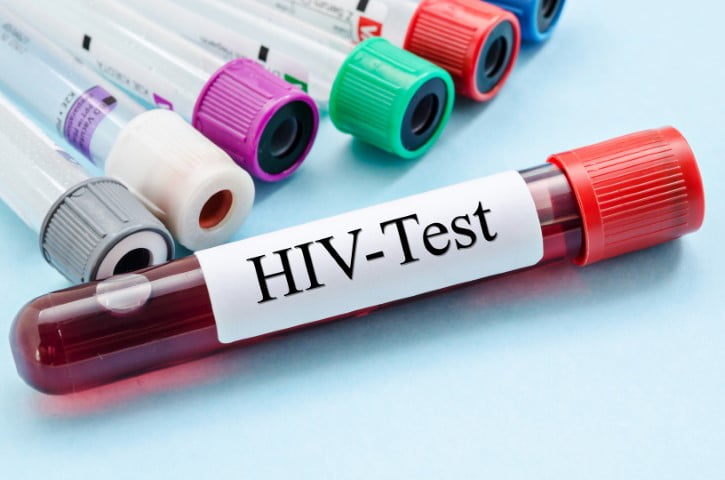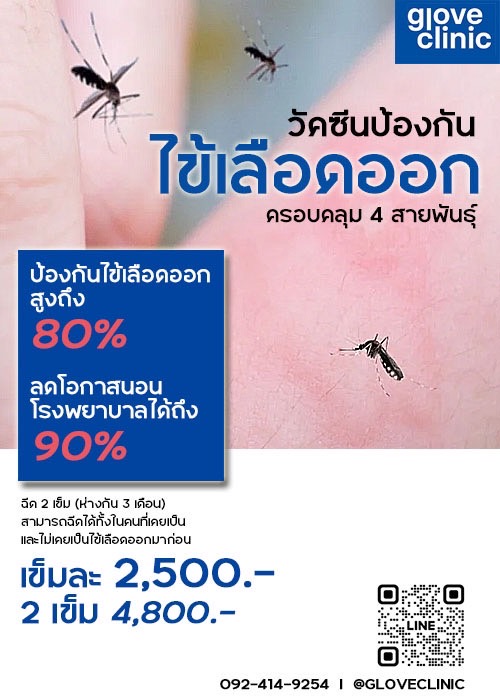294/1 Asia Building (11th Floor), Phyathai, Bangkok
Syphilis Diagnosis and Treatment

Many people are confused about how they could contract syphilis even though they use protection properly. The truth is, syphilis is highly contagious, especially during the secondary stage. Studies have shown that simply having oral sex with someone who has syphilis can increase the risk of contracting the infection by 10-15%.
Furthermore, syphilis often does not present any symptoms after infection, making it difficult to control its spread. Regular blood screening for syphilis (every 3-6 months depending on risk factors) can provide reassurance and allow for early treatment.
Symptoms of Syphilis
Syphilis is a disease that progresses relatively slowly. In the early stage of syphilis (primary syphilis), it occurs after being infected for 3-4 weeks (average of 10-90 days). The infected person may have a sore at the site of infection, which is often a smooth and painless sore. Therefore, the sore can occur on the lips, genitals, or anal area. Many patients may not be aware of the sore, so they do not seek medical treatment.
Secondary syphilis often occurs 2-3 months after being infected. During this stage, patients often have a widespread rash throughout the body. The characteristic rash of syphilis tends to appear on the palms and soles of the feet. In this second stage, patients may also have fever or swollen lymph nodes due to a high amount of bacteria in the body. It can easily spread to sexual partners even with just oral sex.
After that, syphilis can hide in the body without showing symptoms for several years. Therefore, blood tests to detect syphilis are still important for people at risk, even if they do not have symptoms.
Tertiary syphilis often occurs when syphilis has been left untreated for a long time. During this stage, syphilis bacteria can invade the brain or central nervous system (neurosyphilis). It can also cause inflammation of the eye or inflammation of Aorta. This stage can be dangerous as it can affect vital organs and is difficult to treat.
Is syphilis treatable?
Syphilis is treatable. Penicillin, which was discovered by Alexander Fleming, has been used as the main treatment for syphilis since 1943 until the present day. Since syphilis is a sexually transmitted infection that can be asymptomatic, there is now the use of a prophylactic medication called doxycycline. Doxycycline is a medication that can treat syphilis and has minimal side effects. It is used to prevent syphilis infection after sexual intercourse and is called Doxy-Pep.
Preventing Syphilis
- One of the most effective ways to prevent syphilis is to practice safe sex consistently using methods such as condoms, which act as a protective barrier and reduce the risk of infection.
- Regular testing for sexually transmitted infections (STIs) is also important, especially if you have multiple sexual partners. Testing helps detect and treat syphilis early, reducing the risk of complications and further transmission.
- Knowing the sexual history of your partner and having open and direct communication about sexual history is also crucial in preventing syphilis.
Prevention of syphilis requires proactive measures such as taking care of sexual health, practicing safe sex, regular STI testing, and open communication with sexual partners, which greatly reduces the risk of contracting syphilis.
For those who are interested or would like to inquire about additional information about syphilis or STD Tests, you can contact Glove Clinic through Line Official (@gloveclinic) or message them on the Glove Clinic page, or call 092-414-9254.

Interesting facts about syphilis:
- When discussing the history of syphilis, we have to go back several hundred years. The major outbreak occurred in the late 15th century in Europe when the French army invaded the city of Naples, Italy. Italian doctors at that time discovered soldiers with pustular lesions spread throughout their bodies, which were different from the known diseases like leprosy or elephantiasis.
- Before it was called syphilis, the naming of the disease was influenced by the hatred of people during that era. For example, Italians, English, and Germans at that time referred to this disease as the “French disease” or the disease of the French. Meanwhile, the French themselves referred to this disease as the “Neapolitan disease” or the disease of the Neapolitans.
- The name “Syphilis” comes from a novel written in 1530 called “Syphilus sive Morbus Gallicus” by an Italian poet. The protagonist of the story, named Syphilus, was cursed by the god Apollo to have a disgraceful disease. The disease was then named syphilis in the book, following the name of the protagonist.
- The syphilis bacterium was first discovered in 1905 by German doctor and scientist, Erich Hoffmann and Fritz Schaudinn. They found spiral-shaped bacteria from the lesions in the genital area of patients with secondary syphilis.
- Penicillin, which was discovered by Alexander Fleming, has been used as the main treatment for syphilis since 1943 until the present day.
- Syphilis is a disease that progresses relatively slowly. In the early stage of syphilis (primary syphilis), it occurs after being infected for 3-4 weeks (average of 10-90 days). The infected person may have a sore at the site of infection, which is often a smooth and painless sore. Therefore, the sore can occur on the lips, genitals, or anal area. Many patients may not be aware of the sore, so they do not seek medical treatment.
- Secondary syphilis often occurs 2-3 months after being infected. During this stage, patients often have a widespread rash throughout the body. The characteristic rash of syphilis tends to appear on the palms and soles of the feet. In this second stage, patients may also have fever or swollen lymph nodes due to a high amount of bacteria in the body. It can easily spread to sexual partners even with just oral sex.
- After that, syphilis can hide in the body without showing symptoms for several years. Therefore, blood tests to detect syphilis are still important for people at risk, even if they do not have symptoms.
- Tertiary syphilis often occurs when syphilis has been left untreated for a long time. During this stage, syphilis bacteria can invade the brain or central nervous system (neurosyphilis). It can also cause inflammation of the eye or inflammation of Aorta. This stage can be dangerous as it can affect vital organs and is difficult to treat.
- Since syphilis is a sexually transmitted infection that can be asymptomatic, there is now the use of a prophylactic medication called doxycycline. Doxycycline is a medication that can treat syphilis and has minimal side effects. It is used to prevent syphilis infection after sexual intercourse and is called Doxy-Pep.
For those who are interested or would like to inquire about additional information about STD Tests, you can contact Glove Clinic through Line Official (@gloveclinic) or message them on the Glove Clinic page, or call 092-414-9254.
Make Appointment





Relate content :

HIV Test: Everything You Need to Know for Your Health at Glove Clinic
Worried about HIV symptoms? Find out where to get an HIV Test, understand results, and learn about HIV Treatment options. Get confidential STD testing at Glove Clinic.
Your Guide to Sexual Health Clinics: Everything You Need to Know
Are you seeking information about sexual health clinics? Whether you're looking for routine check-ups, specific treatments, or simply want to learn more about your sexual health, this blog post is here to guide you. We'll discuss what sexual health clinics are, how to choose the right one, and provide a spotlight on sexual health clinics…
ฉีดวัคซีนงูสวัดที่ glove clinic
งูสวัดคือไวรัสชนิดหนึ่ง (Herpes zoster) ซึ่งเป็นเชื้อไวรัสตัวเดียวกันกับอีสุกอีใส (Varicella zoster) เมื่อเราติดเชื้อไวรัสอีสุกใสในวัยเด็กแล้ว ไวรัสสามารถที่จะหลบซ่อนได้ในร่างกายเป็นเวลานานหลายปี จนกระทั่งเมื่อร่างกายอ่อนแอ ไวรัสนั้นจึงออกมาทำให้เกิดอาการตุ่มน้ำใส ปวดแสบร้อนตามบริเวณที่เส้นประสาทต่าง ๆ ของร่างกายซึ่งเรียกกันว่างูสวัด
ตรวจ HIV รีวิวความรู้สำหรับการตรวจเอชไอวี (HIV test)
เอชไอวีคือไวรัสที่สามารถติดต่อได้จากการมีเพศสัมพันธ์, การใช้เข็มฉีดยาร่วมกัน, และการติดจากแม่สู่ลูก เมื่อติดเชื้อไวรัส HIV ไวรัสจะทำให้ภูมิคุ้มกันของร่างกายอ่อนแอลง และติดเชื้อโรคอื่น ๆ ได้ง่าย
ปีนี้มีคนไข้ป่วยด้วยไข้เลือดออกมากกว่า 2-3 ปีที่ผ่านมา
เนื่องจากว่าผู้คนกลับมาใช้ชีวิตปกติ มีการเดินทาง จึงพบการระบาดมากขึ้น โดยจากสถิติของกรมควบคุมโรคพบว่ามีผู้ป่วยด้วยไข้เลือดออกในประเทศไทยเกินกว่า 60,000 รายไปแล้วทั้งปี 2566 ไข้เลือดออกเป็นโรคที่ก่อให้เกิดความรุนแรงได้ทั้งในเด็กและผู้ใหญ่ โดยเฉพาะอย่างยิ่งในคนที่เป็นซ้ำครั้งที่ 2 จะมีโอกาสเกิดภาวะช๊อคและเสียชีวิตได้มากขึ้น (โอกาสเสียชีวิตอยู่ราว ๆ 1:1,000) วัคซีนไข้เลือดออกรุ่นใหม่สามารถครอบคลุมได้ทั้ง 4 สายพันธุ์และทั้งนี้ผลการศึกษาพบว่าช่วยป้องกันการติดเชื้อได้ถึง 80% และลดโอกาสการนอนโรงพยาบาลได้ถึง 90% นอกจากนี้ยังสามารถฉีดได้ทั้งในคนที่เคยและไม่เคยเป็นไข้เลือดออกมาก่อน (วัคซีนไข้เลือดออกรุ่นเก่าไม่ควรฉีดในคนที่ยังไม่เคยเป็นไข้เลือดออก) สอบถามข้อมูลเพิ่มเติมเรื่องวัคซีนไข้เลือดออกได้ที่ 092-414-9254, Line Official @gloveclinic (มีแอดข้างหน้า)
